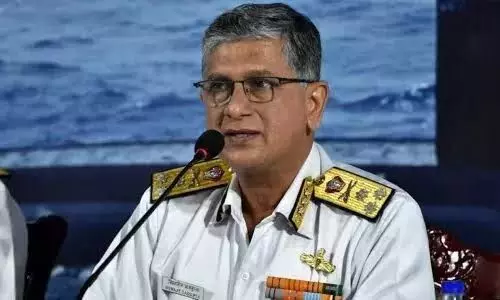Indian Navy to focus on underwater capabilities, plans to increase submarines
Vice-Admiral Dasgupta said the MIG squadron would be based in INS Dega in Vizag as the aircraft carrier INS Vikrant would be based in Visakhapatnam docks from 2024.
By Newsmeter Network
Visakhapatnam: The Indian Navy is all set to increase its underwater capabilities by strengthening surveillance systems and is set to get a boost with more submarines, including nuclear-powered submarines.
Vice-Admiral Biswajit Dasgupta, Flag Officer Commanding in Chief of Eastern Naval Command (ENC), said underwater was the most difficult and challenging domain as only sound and laser travels in the waters. "We will soon deploy unmanned aircraft fitted with sonar to increase the underwater capabilities and to acquire more submarines. Apart from conventional class submarines, the Navy would also have a follow up of its only nuclear-powered submarine INS Arihant," he said.
The Indian Navy is getting ready for the first batch of Aginiveer women in a few months. This is the first time in the history of the Indian Navy that women have been recruited below officer rank under the Agnipath recruitment scheme. The first batch began their training at INS Chilka in Odisha from 1 December and their training will be completed in March next year. "The idea is to have 20% women in the Agniveer force and they will be deployed at various ships," the flag officer said.
Vice-Admiral Dasgupta said the MIG squadron would be based in INS Dega in Vizag as the aircraft carrier INS Vikrant would be based in Visakhapatnam docks from 2024. Around that time, the Navy Alternative Operational Base (NAOB) at Rambilli would also be commissioned, he said.
"The Eastern Naval Command (ENC) remains committed to defend the nation's maritime interests at all times. In these uncertain times, our ships, submarines, and aircraft continue to maintain a high degree of combat preparedness to meet any challenge in our vast area of responsibility. During the year gone by, our ships, submarines and aircraft have ensured continuous monitoring of choke points and movement of vessels of interest in our area of responsibility through regular deployments and comprehensive surveillance," said Vice-Admiral Dasgupta.
He added, "While the Indian Navy is charged with overall maritime security, security in waters close to the coast and within our maritime zones is mandated to the Coast Guard, coastal police forces, customs, fisheries, immigration, intelligence agencies, offshore oil and gas operators and many other stakeholders. In order to synergise efforts, coordination mechanisms exist and periodic readiness drills are conducted. Our coastal population act as our eyes and ears and we endeavour to sensitise them to threats and seek their assistance in identifying vulnerabilities and spotting unusual activities."